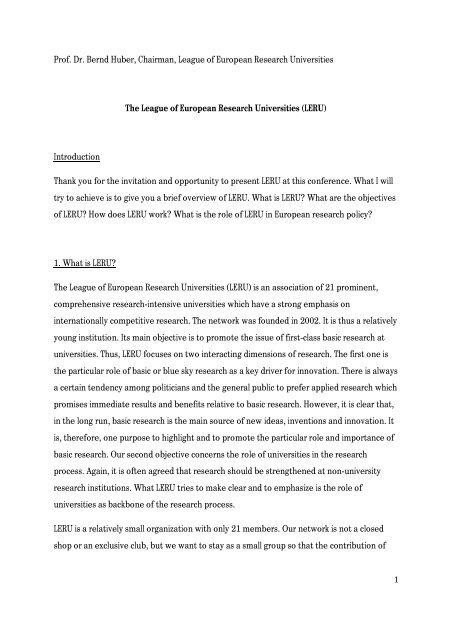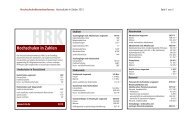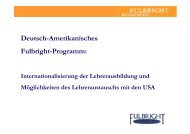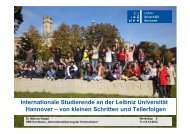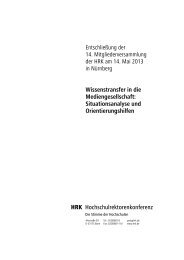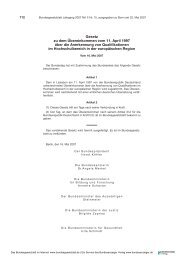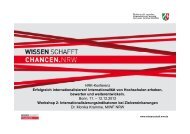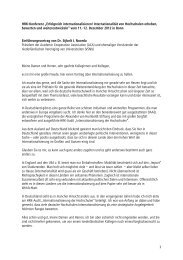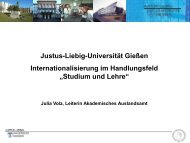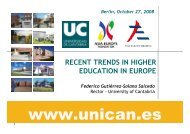Presentation LERU Prof Dr Bernd Huber for online publication_V2
Presentation LERU Prof Dr Bernd Huber for online publication_V2
Presentation LERU Prof Dr Bernd Huber for online publication_V2
You also want an ePaper? Increase the reach of your titles
YUMPU automatically turns print PDFs into web optimized ePapers that Google loves.
<strong>Prof</strong>. <strong>Dr</strong>. <strong>Bernd</strong> <strong>Huber</strong>, Chairman, League of European Research Universities<br />
The League of European Research Universities (<strong>LERU</strong>)<br />
Introduction<br />
Thank you <strong>for</strong> the invitation and opportunity to present <strong>LERU</strong> at this conference. What I will<br />
try to achieve is to give you a brief overview of <strong>LERU</strong>. What is <strong>LERU</strong>? What are the objectives<br />
of <strong>LERU</strong>? How does <strong>LERU</strong> work? What is the role of <strong>LERU</strong> in European research policy?<br />
1. What is <strong>LERU</strong>?<br />
The League of European Research Universities (<strong>LERU</strong>) is an association of 21 prominent,<br />
comprehensive research-intensive universities which have a strong emphasis on<br />
internationally competitive research. The network was founded in 2002. It is thus a relatively<br />
young institution. Its main objective is to promote the issue of first-class basic research at<br />
universities. Thus, <strong>LERU</strong> focuses on two interacting dimensions of research. The first one is<br />
the particular role of basic or blue sky research as a key driver <strong>for</strong> innovation. There is always<br />
a certain tendency among politicians and the general public to prefer applied research which<br />
promises immediate results and benefits relative to basic research. However, it is clear that,<br />
in the long run, basic research is the main source of new ideas, inventions and innovation. It<br />
is, there<strong>for</strong>e, one purpose to highlight and to promote the particular role and importance of<br />
basic research. Our second objective concerns the role of universities in the research<br />
process. Again, it is often agreed that research should be strengthened at non-university<br />
research institutions. What <strong>LERU</strong> tries to make clear and to emphasize is the role of<br />
universities as backbone of the research process.<br />
<strong>LERU</strong> is a relatively small organization with only 21 members. Our network is not a closed<br />
shop or an exclusive club, but we want to stay as a small group so that the contribution of<br />
1
each of our member universities is significant and visible. And this is also the reason why<br />
cohesion and cooperation within our network is strong and vibrant.<br />
The <strong>LERU</strong> office which is based near Brussels has a total of five staff members. The office is<br />
run by <strong>LERU</strong>’s Secretary General, <strong>Prof</strong>essor Kurt Deketelaere, whom probably many of you<br />
know.<br />
I would like to give you some figures with regard to our members: The 21 universities that<br />
<strong>for</strong>m our network are from 10 countries. Member universities are, <strong>for</strong> example, Ox<strong>for</strong>d,<br />
Cambridge, Zürich, Strasbourg, and Heidelberg. Together, they have about 550,000 students,<br />
ca. 50,000 of them being PhD candidates. Our members award 12,000 doctorates per year.<br />
The total research budget of all members per year exceeds 5 billion Euros. Roughly 20 % of<br />
all ERC grants accrue to our members, and more than 230 Nobel Prizes and Field Medal<br />
winners have studied or worked at our member universities. 1<br />
The organizational structure of the league is very simple and transparent: The highest body<br />
is the Rectors‘ Assembly which takes all strategic decisions and meets twice a year. The<br />
Board of Directors implements the decisions of the Rectors‘ Assembly and monitors the<br />
budget. I have the honor to currently serve as chairman.<br />
2. How does <strong>LERU</strong> achieve its goals?<br />
<strong>LERU</strong> pursues its objectives in two ways. First, we are an active partner in the dialogue with<br />
all the institutions at the European level. This concerns the European Commission, the<br />
European Research Council, and the EIT. <strong>LERU</strong> also cooperates with other stakeholder<br />
organizations like the EUA. One has clearly to admit that this is a kind of lobbying ef<strong>for</strong>t in<br />
the political arena to promote the role of basic research and the role of research-intensive<br />
universities. The second instrument is the standard instrument of academics: <strong>publication</strong>s.<br />
Over the years, <strong>LERU</strong> has published numerous policy papers, policy proposals and<br />
statements. The topics range from fundamental issues like the role of universities and the<br />
1 League of European Research Universities (2013). About <strong>LERU</strong>. Available at:<br />
http://www.leru.org/index.php/public/about-leru/ (accessed 16 January 2013).<br />
2
nature of the research process to urgent and more practical issues like social security law as<br />
an impediment to the mobility of researchers across Europe. In addition, <strong>LERU</strong> has published<br />
papers on the current policy debate in Europe, <strong>for</strong> example on the European Research Area<br />
(ERA).<br />
I think it is fair to say that the <strong>LERU</strong> papers have had a significant impact on the debate on<br />
research and higher education policy. The papers have helped to clarify and to frame the<br />
underlying issues in many debates and have made proposals <strong>for</strong> political solutions. The high<br />
quality of the <strong>LERU</strong> papers is one key factor in the success of <strong>LERU</strong>.<br />
3. What has <strong>LERU</strong> achieved so far?<br />
Last year, <strong>LERU</strong> celebrated its ten year anniversary. That gave us the opportunity to take<br />
stock and to assess what we have achieved so far. I think there is strong consensus that <strong>LERU</strong><br />
has established itself as one major stakeholder in the European policy debate. While other<br />
organizations pursue somewhat different goals, <strong>LERU</strong> can be seen as the institution<br />
representing the interests of research-intensive universities with a clear focus on basic<br />
research. The role of <strong>LERU</strong> as a stakeholder in European Research policy can also be seen by<br />
the fact that <strong>LERU</strong> is among the first signatories of the Memorandum of Understanding on<br />
the further realization of the European Research Area.<br />
In the future, we will intensify our ties with international institutions like the Association of<br />
American Universities (AAU) in the US, the Group of Eight in Australia or the C9 League in<br />
China.<br />
3


